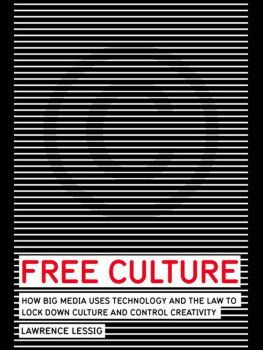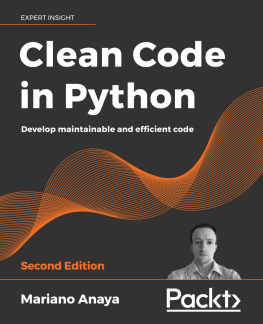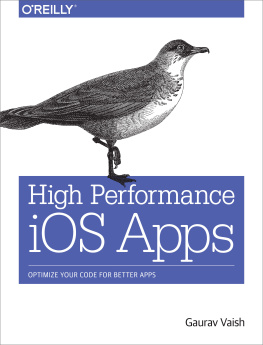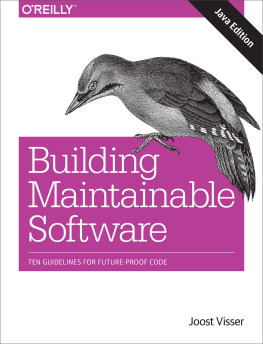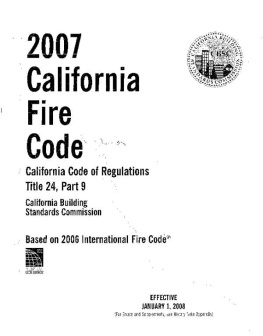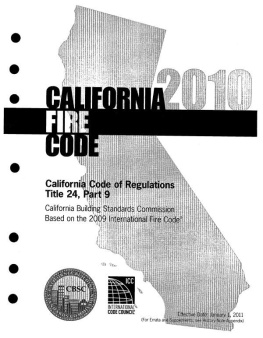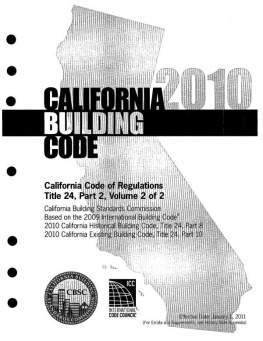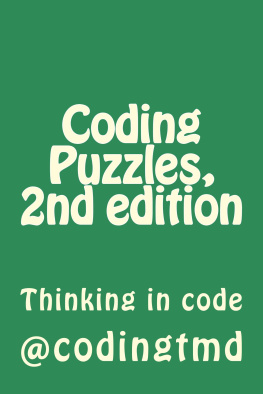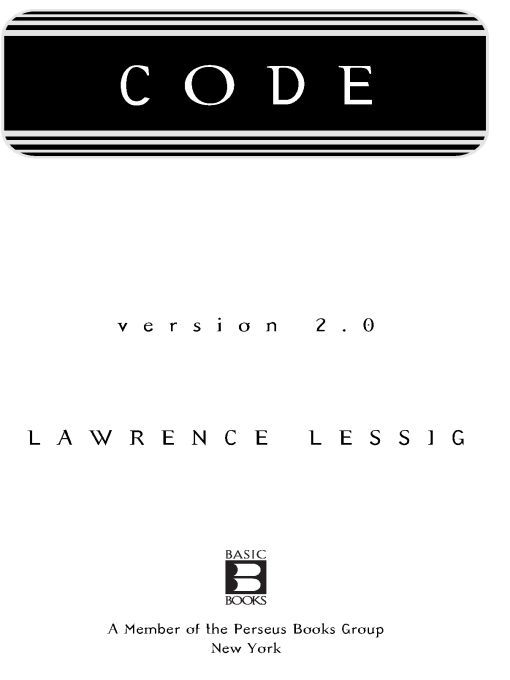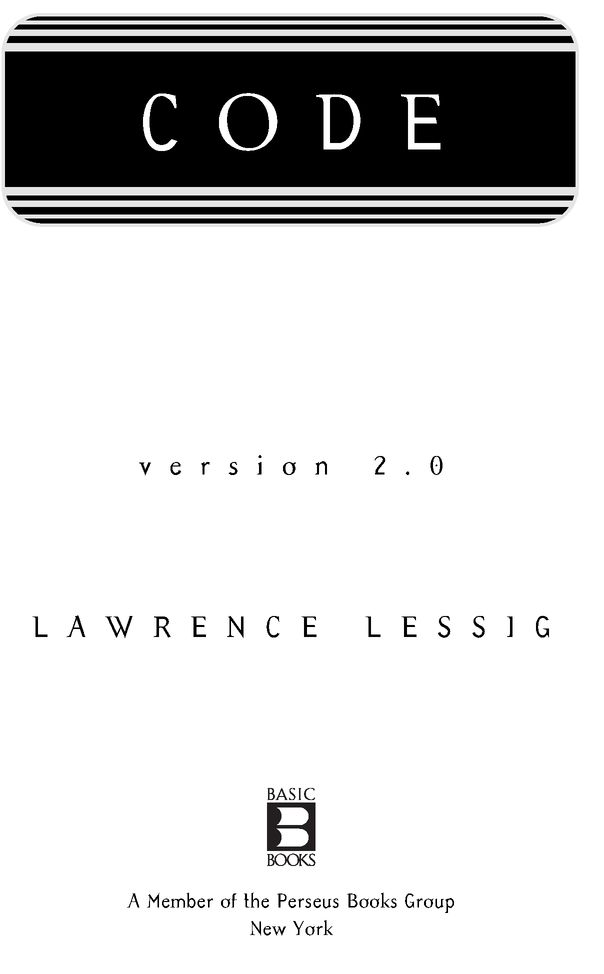Table of Contents
Code version 1.0
FOR CHARLIE NESSON, WHOSE EVERY IDEA
SEEMS CRAZY FOR ABOUT A YEAR.
Code version 2.0
TO WIKIPEDIA,
THE ONE SURPRISE THAT TEACHES MORE THAN EVERYTHING HERE.
PREFACE TO THE SECOND EDITION
This is a translation of an old bookindeed, in Internet time, it is a translation of an ancient text. The first edition of this book was published in 1999. It was written in a very different context, and, in many ways, it was written in opposition to that context. As I describe in the first chapter, the dominant idea among those who raved about cyberspace then was that cyberspace was beyond the reach of real-space regulation. Governments couldnt touch life online. And hence, life online would be different, and separate, from the dynamic of life offline. Code v1 was an argument against that then common view.
In the years since, that common view has faded. The confidence of the Internet exceptionalists has waned. The ideaand even the desirethat the Internet would remain unregulated is gone. And thus, in accepting the invitation to update this book, I faced a difficult choice: whether to write a new book, or to update the old, to make it relevant and readable in a radically different time.
Ive done the latter. The basic structure of the first edition remains, and the argument advanced is the same. But Ive changed the framing of particular examples, and, I hope, the clarity of the writing. Ive also extended the argument in some parts, and added brief links to later work in order to better integrate the argument of the original book.
One thing I have not done, however, is extend the argument of this book in the places that others have worked. Nor have I succumbed to the (insanely powerful) temptation to rewrite the book as a response to critics, both sympathetic and not. I have included direction in the notes for those wanting to follow the arguments others have made in response. But, even more than when it was first published, this book is just a small part of a much bigger debate. Thus, you shouldnt read this to the exclusion of extraordinary later work. Two books in particular already published nicely complement the argument made hereGoldsmith and Wus Who Controls the Net? (2006), and Benklers The Wealth of Networks (2006)and a third by Zittrain, expected in 2007, significantly extends the same argument.
I have also not tried to enumerate the mistakes, real and alleged, made in the first edition. Some Ive simply corrected, and some Ive kept, because, however mistaken others take them to be, I continue to believe that they are not mistakes. The most important of the second type is my view that the infrastructure of the Net will become increasingly controlled and regulable through digital identity technologies. Friends have called this mistake a whopper. It is not. Im not sure what time horizon I had in mind in 1999, and I concede that some of the predictions made there have not come to passyet. But I am more confident today than I was then, and thus I have chosen to stick with this fundamental mistake. Perhaps this is simply to hedge my bets: If Im right, then I have the reward of understanding. If Im wrong, then well have an Internet closer to the values of its original design.
The genesis of the revisions found here was a wiki. Basic Books allowed me to post the original edition of the book in a wiki hosted by Jotspot, and a team of chapter captains helped facilitate a conversation about the text. There were some edits to the text itself, and many more valuable comments and criticisms. I then took that text as of the end of 2005 and added my own edits to produce this book. While I wouldnt go as far as the musician Jeff Tweedy (Half of its you, half is me), an important part of this is not my work. In recognition of that, Ive committed the royalties from this book to the nonprofit Creative Commons.
I am grateful to JotSpot () for donating the wiki and hosting services that were used to edit Code v1. That wiki was managed by an extraordinary Stanford undergraduate, Jake Wachman, who gave this project more time than he had. Each chapter of the book, while living on the wiki, had a chapter captain. I am grateful to each of themAnn Bartow, Richard Belew, Seth Finkelstein, Joel Flynn, Mia Garlick, Matt Goodell, Paul Gowder, Peter Harter, Brian Honermann, Brad Johnson, Jay Kesan, John Logie, Tom Maddox, Ellen Rigsby, and Jon Stewartfor the work they volunteered to do, and to the many volunteers who spent their time trying to make Code v1 better. I am especially grateful to Andy Oram for his extensive contributions to the wiki.
In addition to these volunteers, Stanford helped me gather an army of law students to help complete the research that Code v2 required. This work began with fourDavid Ryan Brumberg, Jyh-An Lee, Bret Logue, and Adam Pughwho spent a summer collecting all the work that built upon or criticized Code v1. I relied upon that research in part to decide how to modify Code v1. During the fall semester, 2005, a seminar of Stanford students added their own critical take, as well as classes at Cardozo Law School. And then during the year, two other students, John Eden and Avi Lev Robinson-Mosher, spent many hours helping me complete the research necessary to finish a reasonable draft of Code v2.
No student, however, contributed as much to the final version of Code v2 as Christina Gagnier. In the final months of this project, she took command of the research, completing a gaggle of unresolved questions, putting the results of this 18-month process in a form that could be published, and supervising a check of all citations to verify their completeness and accuracy. Without her work, this book would not have been completed.
I am also grateful to friends and colleagues who have helped me see how this work needed to changeespecially Ed Felten, David Johnson, Jorge Lima, Alan Rothman, and Tim Wu. Jason Ralls designed the graphics for Code v2. And finally, I am indebted beyond words to Elaine Adolfo, whose talent and patience are far beyond anything Ive ever known, and without whom I could not have done this, or much else in the past few years.
PREFACE TO THE FIRST EDITION
In the spring of 1996, at an annual conference organized under the title Computers, Freedom, and Privacy (CFP), two science-fiction writers were invited to tell stories about cyberspaces future. Vernor Vinge spoke about ubiquitous law enforcement made possible by fine-grained distributed systems, in which the technology that will enable our future way of life also feeds data to, and accepts commands from, the government. The architecture that would enable this was already being builtit was the Internetand technologists were already describing ways in which it could be extended. As this network which could allow such control became woven into every part of social life, it would be just a matter of time, Vinge said, before the government claimed control over vital parts of this system. As the system matured, each new generation of system code would increase the power of government. Our digital selvesand increasingly, our physical selveswould live in a world of perfect regulation, and the architecture of this distributed computingwhat we today call the Internet and its successorswould make that regulatory perfection possible.


